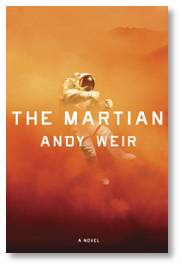 I have mentioned many books in my blog posts but this is the first time I’m writing a post about a single book. It’s called “The Martian” by Andy Weir and it is simply extraordinary. The story revolves around an American astronaut, Mark Watney, who is left for dead on the surface of Mars when the rest of the team is forced to abort the mission. No one at NASA knows he is alive. He has no way to communicate. What he does to survive is purely fascinating.
I have mentioned many books in my blog posts but this is the first time I’m writing a post about a single book. It’s called “The Martian” by Andy Weir and it is simply extraordinary. The story revolves around an American astronaut, Mark Watney, who is left for dead on the surface of Mars when the rest of the team is forced to abort the mission. No one at NASA knows he is alive. He has no way to communicate. What he does to survive is purely fascinating.
The Martian is science fiction only in the sense that it is a fictional story wrapped around the most fascinating science I have encountered in many years. This could all happen–if NASA still had a muscular space program, that is.
Astronaut, engineer and botanist Mark Watney uses all of his considerable knowledge, creativity and ingenuity to survive against a planet that has more ways to kill him than a Michael Bay movie has explosions You will be fascinated, gripped, energized and moved by this book. I was on the edge of my seat more than once, even before I reached the hang-on-by-your-fingernails ending.
Making Science Fun
“The Martian” demonstrates how to make science not just interesting but gripping. A savvy science teacher could build an entire course around this book, touching on many different types and aspects of science. Mr. Weir gives us the answers in the book (phew!) so the teacher would have to plan the course Jeopardy-style.
-
Here’s the answer, now how did Watney get there?
- What was the math? What was the process?
- How did he know that A+B-C would give him result Q?
- Is it possible to make rocket fuel from water?
- How can you grow things in anaerobic soil?
- If the Mars Rover can travel X kilometers on one solar charge, how long will it take Watney to get from the Hab to Schiaparelli Crater and how often will he have to stop and recharge during the trip?
You get the picture. I could quibble with a few things. Mr. Weir gives short shrift, for example, to the psychological impact of being the only living human on an entire planet for an extended period of time. Watney remains resolutely cheerful and energetic despite his extended solitude. Anyone who has seen Cast Away remembers Tom Hanks using an old volleyball for company and being distraught when it’s swept off his raft. This is the kind of insight Mr. Weir would have gotten from our SpaceCrafts Writing Group. It’s good to get a variety of opinions from people who see things that you missed.
Given how good this book is, one would expect that an agent and a science fiction publisher would have snapped it up. After all, it’s survival on a dangerous planet with lots of hard science driving the plot. But no. In the topsy-turvy world of publishing, original is bad (even in the science fiction world where you would expect—even demand—originality) and repetitive is good, as long as it makes money. Taking a risk is not popular. When multiple agents rejected “The Martian,” Andy Weir put it up on his website for free. What followed was heartening.
Fooling the Guard Dogs
According to Wikipedia, “At the request of fans he made an Amazon Kindle version available through Amazon.com at 99 cents (the minimum he could set the price).[5] This garnered the attention of Podium Publishing, an audiobook publisher, and a deal was signed for the audiobook rights in January, 2013. The Kindle edition rose to the top of Amazon’s list of best-selling science-fiction titles where it sold 35,000 copies in three months.[5] This garnered the attention of print publishers and Weir sold it to Crown in March 2013 for six figures.[5]”
See? Nothing gets a publisher’s attention like the fact that the book is already making money. There’s no risk in waiting for people to decide they like a book before you will consider publishing it. (Wait, What?) But this new model also gives authors a way around the guard dogs at the gate of publishing—who so often get it wrong. Frank Herbert’s epic novel “Dune,” arguably the most iconic of science fiction books, was rejected more than 20 times by publishers before Chilton Books picked it up and it went on to become a classic of the genre.
But wait, there’s more. Twentieth Century Fox has optioned film rights and hired screenwriter Drew Goddard to adapt and direct The Martian. (Can you think of a more perfect name for the director of a movie about rockets?) Unfortunately, Mr. Goddard’s other commitments make it unlikely he will be able to direct, leaving Fox to find a replacement. Matt Damon is considering the role of Mark Watney but Fox Searchlight has to replace Mr. Goddard before Mr. Damon will sign on. So, eventually, the movie will take us where no man has gone before and we can watch Astronaut Watney’s fight to survive against massive odds.
If you like science, science fiction, terse writing, survival stories, thrillers, MacGyver, humor, or tests of courage and ingenuity, you’ll love The Martian.
Or you can wait for the movie.

